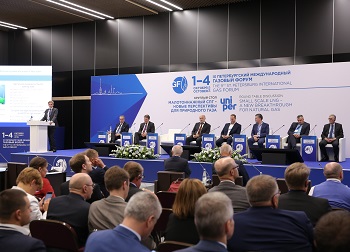
The European small scale LNG market is perspective, although its development is hampered by conservatism of potential consumers (especially in the field of marine transportation) and strict legal regulations in many European states that don’t always acknowledge natural gas as a clean energy source. This was the announcement made by Kimmo Rahkamo, Vice President for Natural gas and LN at Gasum, at the round-table discussion Small-scale LNG – new breakthrough for natural gas.
Reports on the subject offered for discussion were made by directors and top managers of energy and gas companies, operating in Russia, Finland, Estonia, and Latvia. All the speakers reported with one voice that small scale LNG is perspective, but to make specific alternative fuel projects efficient, a variety of conditions has to be fulfilled.
One of such conditions is the reasonably arranged logistics. Key LNG consumers need an opportunity to buy gas from suppliers within a radius of 500 km, said Sergey Efimov, Head of LNG Supply and Logistics Department at Eesti Gaas. Arthur Dianov, Head of LNG Development Department for Baltic countries and Scandinavia at Alexela, emphasized that industrial companies can benefit from investing into gas equipment acquisition and installation only in case their production sites consume min. 2 MW/hour.
All the speakers stated in their reports that the infrastructure is poorly developed in the East Europe and Russia, which makes it difficult to use LNG as engine fuel. Oleg Bogachek, CEO of Uniprom Energy, said that there is a certain development potential for this market at Balkans, where there are many places without gas pipelines at all, and where fuels are delivered by overland transport. At the same time, the key obstacle preventing development of small scale LNG export from Russia into Europe are traffic jams at the borders. “The time that our cargo gas carriers might need to cross the Russia-Estonia border is impossible to forecast. That’s a bottleneck where it is easy to get stuck. Unexpected delays at the borders that sometimes reach 20 hours break our entire schedule of LNG supplies to our consumers,” Sergey Efimov complained.